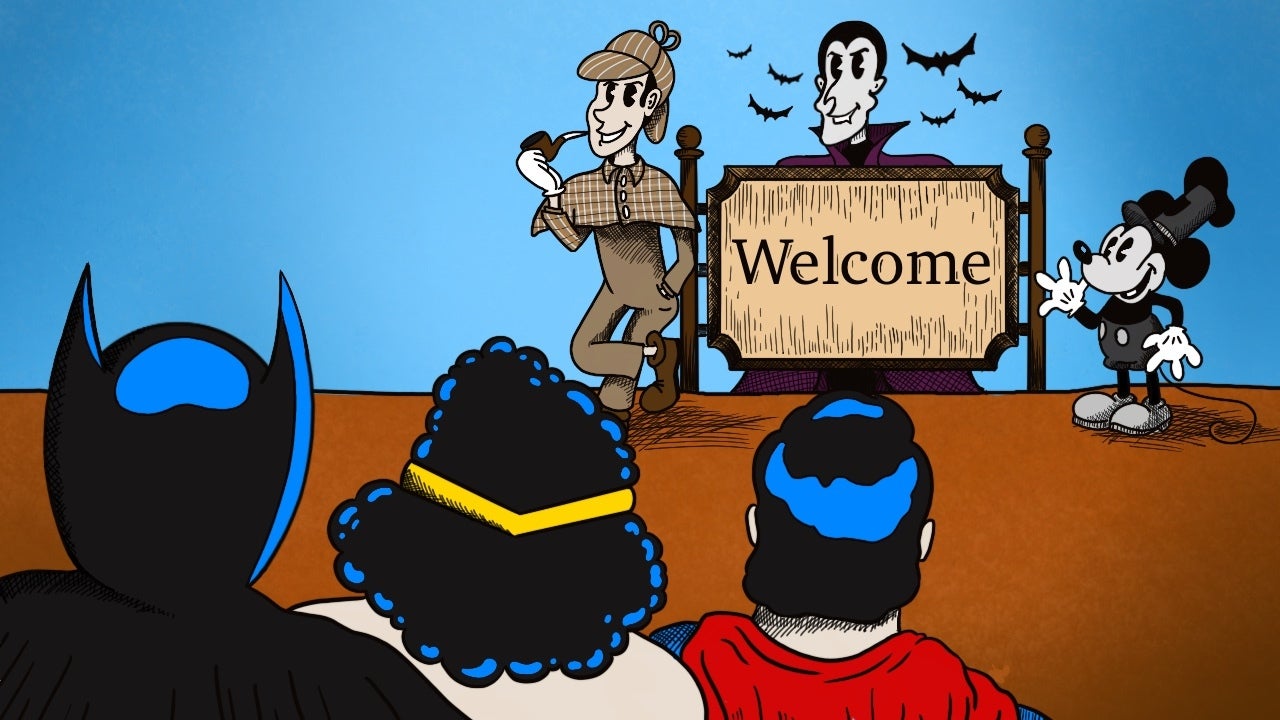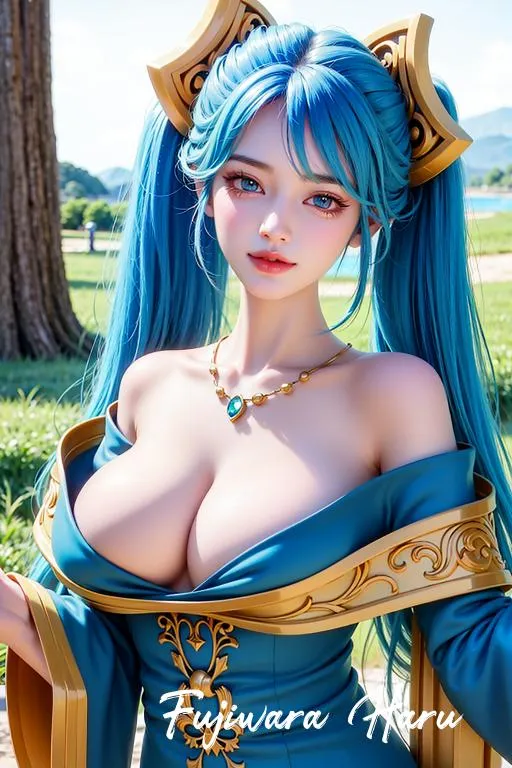“When Superman and Batman Copyrights Expire in a Decade, Will It Be Kryptonite for DC?” asked a headline in Variety earlier this year. As dictated by Betteridge’s Law, the answer in a broad sense is no. But in the wake of Steamboat Willie-era Mickey Mouse going public domain at the beginning of this year — here he is promoting the new season of Last Week Tonight for HBO, a division of Disney rival Warner Bros. Discovery — an inkling that the sky may soon start falling has been creeping around a Hollywood staking its value on IP portfolios.
With several of DC’s major copyrights set to lift in the ‘30s (Superman and Lois Lane in 2034, Batman in 2035, the Joker in 2036, and Wonder Woman in 2037), the Variety item imagines a future flooded with unauthorized comic books featuring these household names. A quoted comics expert predicts that “100 of them” will be “ready to go” as soon as the law allows, and the article carries that logic over to the silver screen, suggesting that studios may be eager to mint their own versions of characters as they’ve previously done for public domain characters like Robin Hood or Dracula. The mind pictures a dystopian marquee advertising a given weekend’s offerings as a choice between Warner’s Superman Rising, Universal’s Tale of the Superman, and Disney’s Superman and Friends.
The likelier outcome, as some legal scholars are countering, won’t be so dire for DC nor so flattening for the multiplex. The law will leave a handful of important guardrails in place to prevent a market clogged with indistinguishable duplicates of the same icons, the intended function being specifically to avoid consumer confusion among identical rip-offs. In the best-case scenario, in fact, these developments could usher in an era of legally mandated creative refreshment.
“That Superman is entering public domain doesn’t mean you can go and write your own Superman comic,” says Brian Frye, a professor at University of Kentucky’s Rosenberg College of Law. (He’s also the producer of the documentary Our Nixon, which flexed quite a few fair-use muscles in sampling footage of Tricky Dick.) “It means that you might be able to use the Superman character in your own story without infringing on anything that belongs to DC.”
In theory, copyright law serves a just and useful purpose, ensuring that the labor of artists can’t be sold by some other entity as their own. For the duration of the author’s life and then another 70 years (or, for corporate works, 95 years after publication), they own the rights to their work; to cite perhaps the most well-known example, this is why DC can’t get in the Spider-Man business. A significant difference separates Amazing Fantasy #15 itself from the character of Spidey as he’s known and loved, however.
“Copyright law protects things that are fixed in a tangible medium of expression, so traditionally, that’ll mean a photo, a painting, a sculpture, an episode of TV, a comic book, a novel,” explains Alexandra Jane Roberts, a professor of law and media at Northeastern University. “The idea of protection for characters comes out of that, but it can be a bit nebulous. We have some case law saying that characters who are well-defined over the course of numerous works can become protectable, things like James Bond, Sherlock Holmes, Rocky. James Bond likes his drink a certain way, he dresses a certain way, he says certain lines, and from this, we get a recognizable character that can be protected by copyright.”
Because this is a cumulative process that happens over time, these copyrights expire piecemeal. Superman as a concept becomes available long before his weakness to kryptonite or ability to fly, Wonder Woman will be fair game one year prior to her Lasso of Truth, etc. So with each intellectual property dealt with on a case-by-case basis and strewn with grey areas, the question becomes, rather, what is allowed? And in terms of studio protocol, what’s likely to actually happen?
Any answer hinges in large part on the difference between a copyright (which protects a creative work) and a trademark (which protects phrases or iconography that makes up a business’ brand). A trademark has no expiration date, in essence meant to preclude companies from passing off their products as another’s. “It’s one thing to use a character in a copyrighted way, for example, Mickey Mouse or Superman or Wonder Woman in another story,” says Frye. “It’s another thing entirely to use these characters in a way that communicates something to consumers about the source of what’s being produced. The closer you get to making consumers think that the source of whatever you’re producing is Disney or DC, the more likely it is you’re moving into trademark rather than copyright territory.”
For a studio hoping to make the next big blockbuster, this poses an obstacle: Anyone attempting to capitalize on the familiarity of Superman would have to sand off a lot of what makes him familiar. The law encourages use of an idea’s broadest contours, its general outline more than the particulars contained within. This can start to create wiggle room for characters identified less by their biography than their image. Dracula, for one, is understood as a vampire of exceptional power; everything beyond that is up to filmmakers, who have translated the character across genres, settings, and even racial lines.
“People have been behaving as though the later versions of Mickey Mouse included in works not yet part of the public domain are off-limits, when I’m not 100% confident that that’s what the law requires,” says Roberts.
“The way copyright law works says that you can only claim copyright ownership insofar as what you’re claiming is an original element, in a significant aspect,” Frye adds. “Are subsequent Mickey characters different from Steamboat Willie? Yes. But are they that different, that you wouldn’t recognize the new one? The big differences are he’s in color, he has gloves and a red shirt — those aren’t really copyright-worthy elements. These are trivial, I think. Mickey in specific is kind of one-dimensional. Wonder Woman and Superman, they have a fair amount of backstory, additional elements added over the years.”
Frye charts one possible path forward through a case study from 1978, when Disney brought legal action against the underground comix collective known as the Air Pirates. They’d used Mickey Mouse for satirical purposes, corrupting the icon of wholesome pop culture Americana with drug use and foul language, and Disney argued that this had damaged the reputation of the company. The courts ruled that the Air Pirates had infringed on the then-active copyright of Mickey Mouse, and that Disney’s points about trademark were moot. But today, with copyright no longer an issue, this case would’ve fallen in favor of the Air Pirates, because they’d used solely the appearance of Mickey in a context that was a clear, drastic departure from the established character.
“Now, could you do something similar with Superman or Wonder Woman?” Frye asks. “Probably! If you make them look like the old characters, or draw them in your own way.” What would Wonder Woman be like as a government peacekeeper in an alternate America? How about Superman as a hardboiled noir detective? The characters we know can supply a jumping-off point for an infinite galaxy of revisions, remixes, and deconstructions.
Copyright law is intended to benefit the artists as well as the public, the people who enjoy their work and want to see them compensated fairly for it. It’s by design that these impending copyright expirations will do the most good for smaller, independent outfits, those looking to do something radically revisionist or even heretical with our graven idols. For the big corporate studios, avoiding trademark infringement means putting enough distance between themselves and Superman as we know him that the commercial appeal may not be as built-in as they’d hope. But creators with a sincere interest in using these narrative building blocks — in actually turning superheroes into the modern-day myth figures they’re so often described as — to construct something wholly novel will gain bracing new freedoms.
“The speculation is that these things will look and feel fake or knockoff-y,” Roberts says. “But what we’ve seen with Winnie-the-Pooh: Blood and Honey and Mickey Mouse is that there’s almost a hunger for that; people have a curiosity about it. People get excited about the possibility of off-beat things being done with a character they know, so my guess — and maybe hope — is that studios do some more creative things here, make some more interesting choices. Change things up, less like a knockoff and more like a sly wink.”
Illustrations by Danielle Jones






